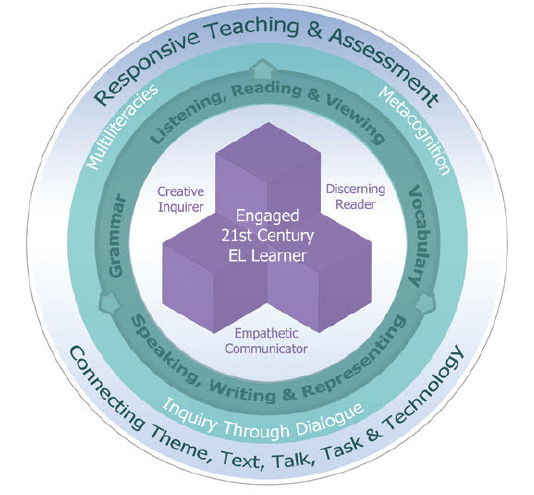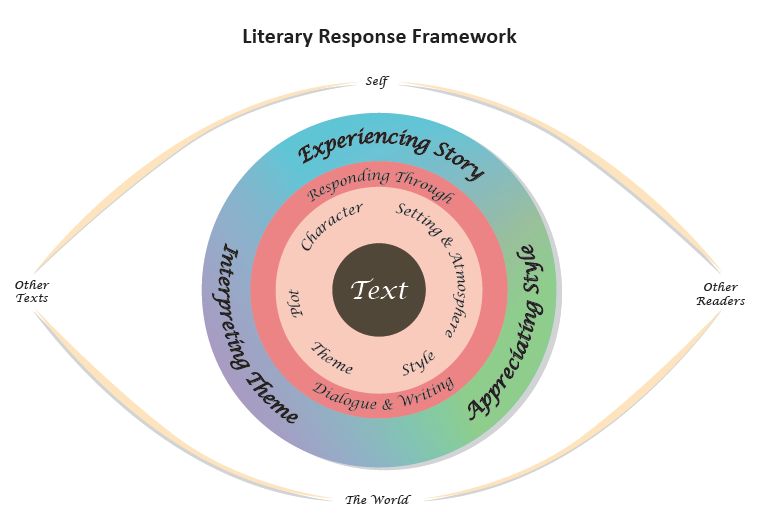English & Literature
Teachers in English Language
-
Mr. Benjamin Lim
-
Ms. Farah Zeeba Kasbolla
-
Ms. Jessica Yap
-
Ms. Nur Syarmeen Ehsan Ahmad
-
Mrs. Rani Rama
-
Mr. Rodney Goh
-
Ms. Siti Latifah Ishar
-
Ms. Koh Hwee Kiang
-
Ms. Cheong Li Yun
Objective
Every Gabrielite to be effective and confident in communicating in the
English Language.
Programme
The curriculum seek to develop linguistic competencies in our students
through the teaching and learning of English to enable Gabrielities to
be empathetic communicators, discerning readers and creative enquirers.
The syllabus develops effective and affective language use in students
in the following areas:

|
|
|
|
Pictorial representation of English Language
|
Student learning outcomes to impact head, heart, hands
1. Discerning Reader (Hand)
- Students are able to read, listen and view critically and with accuracy,
understanding & appreciation of a wide range of literary and informational/functional
texts from print and non-print sources
2. Empathetic Communicator (Heart)
- Students are able to speak, write & represent in Standard English
that is grammatical, fluent, mutually intelligible & appropriate for
different purposes, audiences, contexts & cultures.
3. Creative Inquirer (Head)
- Understand and use Standard English grammar and vocabulary accurately
& appropriately as well as understand how speakers/writers put words
together & use language to communicate meaning and achieve impact.
|
|
Key teaching and learning pedagogies and strategies
Introduction of 3 foci:
Inquiry through Dialogue (1st focus)
Multiliteracies (2nd focus)
Metacognition (3rd focus)
Pedagogy - the 5Ts:
Connecting Theme, Text, Talk, Task & Technology
Guided by LLIPS amp; ACoLADE(General) Learner Strategies to be taught:
Close reading skills (Reading & Viewing)
Note-taking skills (Writing & Representing)
Presentation skills (Speaking & Representing)
(Simple) research skills
|
Assessment indicators of students achieving the learning outcomes
Assessment Tools:
Discrete performance tasks that assess specific EL skill taught (e.g.
podcast: pronunciation & reading aloud, quizzes, targetted practice
like essays etc.)
Integrated assessment to assess different EL skills taught (e.g. oral
presentations, compositions, written reflections)
Assessment Indicators:
Students can read, listen & view widely a range of multi-modal text
& text forms.
Students will speak, write & represent for creative, personal, academic
& functional purposes by using language in a sustained manner &
by representing their ideas in a range of multimodal texts & text forms.
Students can display/attain SSABs in EL Syllabus 2020
|
Teachers in Literature
-
Ms. Jessica Yap
-
Ms. Siti Latifah Ishar
-
Ms. Koh Hwee Kiang
Programme
Lower Secondary
Gabrielites are introduced to a range of literary texts in prose, poetry
and drama. They also begin to learn how to respond to and analyse such
literary writing. Those who are keen on Literature can choose to offer
Literature in English at GCE O Level at the end of Secondary Two.
Upper Secondary
Garbrielites will study the subject more deeply; delving into the literary
analysis of the texts offered. They will also be taught to hone and produce
sustained and critical responses to the texts they study.
Upper Sec. Literature Texts for 2022
-
Drama: Macbeth by William Shakespeare
-
Prose: Hook & Eye: Stories from the Margins edited by Philip Holden
-
Unseen Poetry
Upper Sec. Literature Texts for 2023
-
Drama: Boom by Jean Tay
-
Prose: The Chrysalids by John Wyndham
-
Unseen Poetry
Lower Sec. Literature Texts for 2023
-
Drama: Frankenstein adapted by Phillip Pullman
-
Novel: The Boy in the Striped Pyjamas by John Boyne
-
Poetry
|
Pictorial Representation of Literature in English
|
Student learning outcomes to impact head, heart, hands
To develop students’ ethical, aesthetic and intellectual considerations
through the study of Literature so that they can become:
Global & Empathetic Thinkers
Critical Readers
Creative Meaning-makers
Convincing Communicators
|
|
Key teaching and learning pedagogies and strategies:
Teaching Pedagogies:
Personal Engagement with Literature texts
Making Meaningful Connections to self, others and the world
Critical Appreciation
Reflective Practice
Learning Pedagogies: Study of Prose, Poetry and Drama through:
Experiencing Story,
Appreciating Style &
Interpreting Themes
Strategies for teaching & learning:
Close reading skills
Inductive questioning
Role play
Exploratory talk
Draw up AfL success criteria using LOs & KSDs
|
Assessment indicators of students achieving the learning outcomes:
Assessment Tools:
Students display/attain KSDs listed in 2019 Syllabus
Written reflections, small-scale projects, guided passage-based questions/essays
etc.
Formal assessment of students in all three genres of Literature, and
on their ability to produce sustained, critical responses to:
passage-based and essay questions (for Express students); and
modified passage-based and guided essay questions [for NA students].
|




